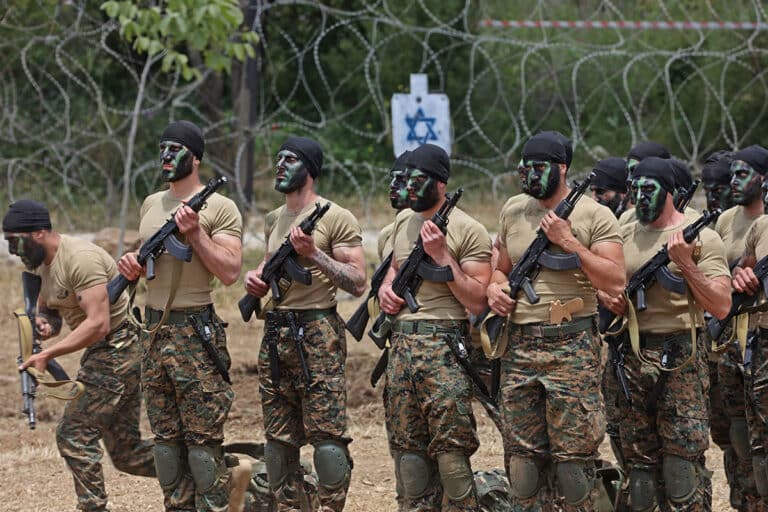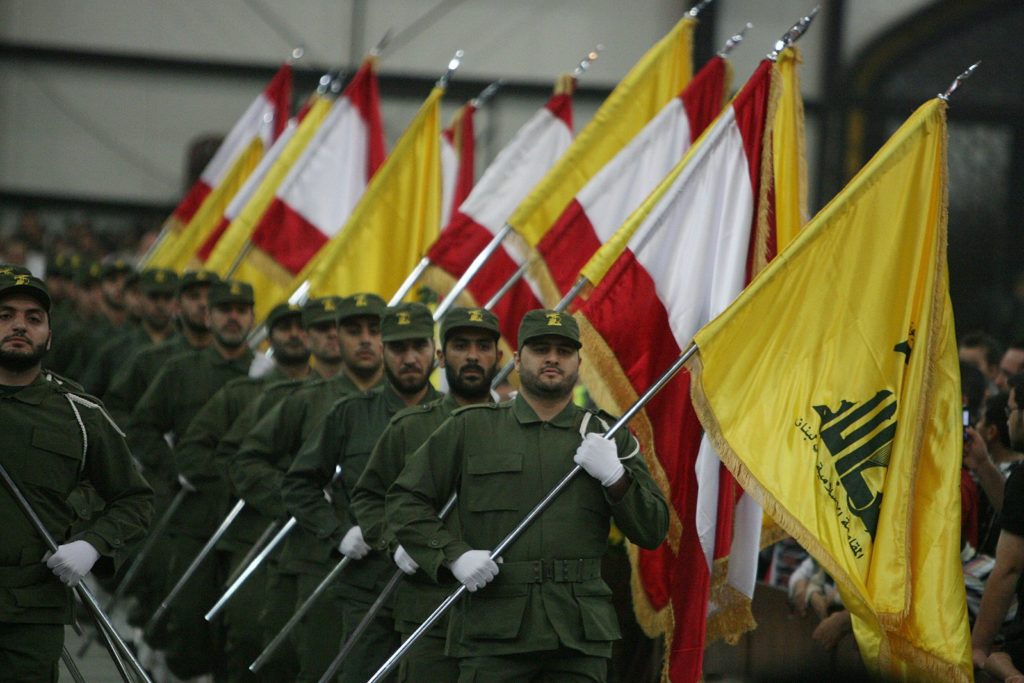
The day after Hamas launched its assault on southern Israel, Hezbollah joined in, targeting communities and military bases along Israel’s northern border with Lebanon.
And as Israel prepares for a likely ground invasion of the Gaza Strip, the IDF is paying close attention to the northern border, too. Hezbollah — along with other Iranian proxies in the region — has reportedly threatened to join the war if Israel invades Gaza. Tens of thousands of Israeli troops and many tanks and armored vehicles have been sent up north to prepare for that possibility.
What is Hezbollah?
Hezbollah (which means “Party of God” in Arabic) is a terrorist organization based in Lebanon. They are the brainchild of the Iranian Ayatollah Ruhollah Khomeini, who brought his Islamist revolution to Shia communities in southern Lebanon.
Since its inception in 1982, Hezbollah has targeted Americans, Israelis, and Jews in Lebanon and beyond. And though their primary objective, according to leader Hassan Nasrallah, is to eradicate Israel, they do not confine their attacks to Israel alone.
In fact, they’ve orchestrated several devastating attacks against Jews all over the world, including a bus full of Israeli tourists in Bulgaria and a strike on a Jewish community center in Buenos Aires that claimed 85 lives.
Though Lebanon is in dire economic straits, Hezbollah enjoys financial support from Iran, to the tune of over $700 million per year.
Why would Iran, whose economy has been crippled by sanctions, spend so much money arming a foreign group?
Well, their goals are in line with Hezbollah’s. According to Hezbollah’s first manifesto, released in 1985, their ultimate goal is to establish an Iranian-style Islamic Republic in Lebanon. They’ll measure their success as follows: “Our struggle will end only when this entity [the state of Israel] is obliterated.”
The U.S., Canada, the United Kingdom, Germany, the Arab League, Israel and many other countries consider Hezbollah to be a terrorist organization.
The E.U. however, is a bit more measured in its condemnation. Hezbollah has multiple wings, including a political wing. The E.U. designates Hezbollah’s military wing as a terrorist group, but legitimizes their political activities.
Those political activities include providing social services to a long-neglected Shia community in southern Lebanon. Hezbollah has built infrastructure, including clinics and schools, in poor Shia communities. And in return, many Lebanese Shias have repaid the terror group with substantial support.
What does Hezbollah believe?

While Hezbollah’s base is in Lebanon, the terrorist movement’s roots are in Iran. Their manifesto states “We obey the orders of one leader…Ruhollah Khomeini.”
But Hezbollah was formed during a moment of intense civil war in Lebanon. And as such, their original manifesto affirmed their commitment to fighting Israel, France, the US, and the Christian Lebanese Phalange militia.
But the Lebanese Civil War is long over. In 2009, Hezbollah released an updated manifesto. But their anti-Israel sentiment is alive and well: “We categorically reject any compromise with Israel or recognizing its legitimacy, this position is definitive, even if everyone recognizes ‘Israel’”. That’s right – they put Israel in quotes.
Hezbollah’s leaders have sometimes claimed that they are only anti-Zionist and not antisemitic. However, their bombing of a Jewish community center in Argentina suggests otherwise. And so does their constant stream of antisemitic rhetoric, including Nasrallah’s assertion that Jews are “the enemies of God” who “invented the legend of the Nazi atrocities.”
And because Hezbollah publishes textbooks used in many Lebanese schools, Lebanese children are being fed a steady stream of antisemitic, Holocaust-denying rhetoric – like the claim that Jews believe they are “ “the masters of the world and the emperors of the universe… this is what made them hated and outcast, and perhaps what intensified people’s aversion to them: their unjustness, their arrogance, their greed, and their monopolizing.”
Hezbollah’s history of conflict with Israel
Israel entered southern Lebanon in 1982, in response to repeated attacks by Palestinian terrorists from Lebanon. At the time, Lebanon was in the midst of a complicated and brutal sectarian civil war. Hezbollah emerged shortly after Israel’s invasion, and focused many of its early activities on fighting Israelis and Americans in Lebanon.
In 2000, the IDF finally withdrew from southern Lebanon, adhering to a boundary created by the United Nations known as the “Blue Line.” But this move did not bring an end to the conflict with Hezbollah. Cross-border raids persisted, along with rocket and anti-tank missile attacks on Israeli forces. The IDF, in return, often launched airstrikes in Lebanon.
In 2006, Hezbollah fired rockets into northern Israel and ambushed an IDF patrol, kidnapping two soldiers. Hezbollah says their aim with these attacks was to get Israel to free Lebanese prisoners in exchange for the captured soldiers. The IDF responded with airstrikes and the situation escalated into the Second Lebanon War.
Since 2006, tensions with Hezbollah have ebbed and flowed, occasionally leading to exchanges of fire along the Lebanese border. However, 2023 has marked a significant rise in this tension, even before the war with Hamas broke out.
Earlier this year, experts were already saying that Israel is the closest to war with Hezbollah it has been since 2006.
In early March, an armed man managed to cross the Lebanese border undetected, traveling 37 miles to the Meggido Junction, where he set off a roadside bomb, seriously injuring an Israeli citizen.
The IDF later neutralized this assailant, who was wearing an explosive belt. Though no group openly claimed responsibility, Israel’s defense community largely suspects that Hezbollah either carried out or facilitated the attack.
The situation escalated further in April when a barrage of 34 rockets was fired from southern Lebanon toward Israel. Although the rockets were likely fired by a Palestinian group, Israeli defense experts believe that Hezbollah had sanctioned it. The IDF responded with airstrikes targeting the rocket launch sites.
In June, Hezbollah intensified their activities at the border, expressing outrage at Israeli efforts to build a security barrier along the border. They organized demonstrations in the contentious Shebaa Farms area, leading to confrontations with the IDF. On multiple occasions, this escalated to the point that Lebanese and IDF soldiers directed weapons at each other, although they did not fire.
Amid these demonstrations, Hezbollah quietly made a symbolic move which they later said was a response to the construction of the security barrier. They erected two tents on the Israeli side of the Blue Line in the disputed Shebaa Farms territory. Although one of the tents was eventually taken down, the other remained.
Shortly after Hezbollah’s mortar attack last Monday, the IDF struck the remaining tent. Hezbollah later claimed that it put the tent back up in a nearby location after it was hit.
The Shebaa Farms, located at the intersection of the Israeli, Lebanese, and Syrian borders, have been a consistent source of tensions since Israel’s withdrawal from southern Lebanon in 2000. Hezbollah and the Lebanese government claim that the area belongs to Lebanon. Israel, meanwhile, maintains that the land became Israeli territory after capturing it from Syria during the Six-Day War.
The UN’s stance is that the land was originally under Syrian control and that any dispute concerning it must be settled between Lebanon and Syria, as the two countries have never reached an agreement concerning their shared border.
What is Hezbollah’s role in the current war?
On October 8, Hezbollah fired a number of mortars on IDF positions at Har Dov (also referred to as the Shebaa Farms), a little west of Mount Hermon.
The terrorist movement said that the attack was launched “in solidarity” with the Palestinians and as part of efforts to claim territory disputed by Israel and Lebanon.
Since then, Hezbollah has continued to send anti-tank missiles towards Israeli military installations on the border – and to pound civilian communities with machine-gun fire. At least three IDF soldiers and one Israeli civilian have been killed in Hezbollah attacks since the fighting began.
Hezbollah is not the only terror group operating on the Lebanese border. The Iran-backed Palestinian Islamic Jihad took credit for a shooting attack that claimed the lives of three additional IDF soldiers. Hezbollah’s near-total control of southern Lebanon suggests that they approved the PIJ attack – as well as attacks from other terrorist groups operating in the region.
As of October 18, 2023, Hezbollah has yet to join the war “officially.” But their threats to do so are concerning enough that the US has sent the USS Gerald R. Ford and USS Dwight D Eisenhower aircraft carriers to the eastern Mediterranean. The message is clear: the US will stand behind Israel.
U.S. President Joe Biden has issued explicit warnings to Iran, Hezbollah, and other groups to avoid joining the conflict, saying “to any country, any organization, anyone thinking of taking advantage of this situation, I have one word: Don’t.”
As of October 18, 2023, no one is certain what is going to happen. But the entire international community is watching Hezbollah and Iran very closely, hoping they do not intensify the Israel-Hamas conflict into a full-scale regional war.
Originally Published Oct 19, 2023 08:32PM EDT


